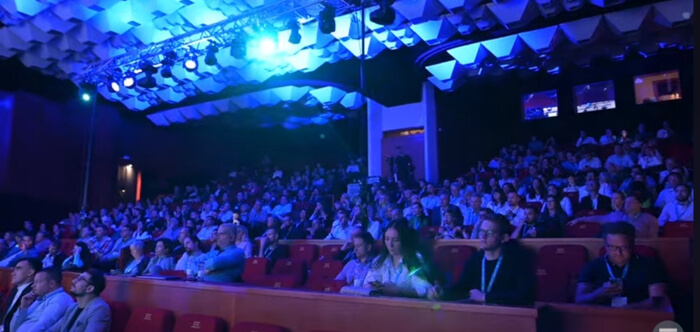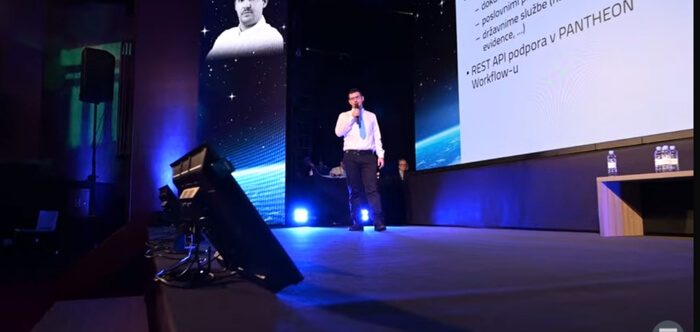Do you want to avoid the same old PowerPoint presentations and monotonous lectures at professional gatherings? We all know that engagement is vital to a successful conference, yet so many events stick to the tried-and-true but incredibly dull formats. If you’ve ever found yourself wondering what to do at a conference to make it more interactive and memorable, you’re in the right place.
We’ve assembled a list of innovative techniques to shake up the atmosphere and foster better engagement. There are countless ways to inject life into your next conference, from utilizing poll questions to organizing table teams, setting up scavenger hunts, displaying graffiti boards, and even incorporating a mini trivia game.
Prepare to revolutionize how you view professional gatherings with these fresh, engaging ideas.
What to Expect at a Conference?
Attending a conference can be an exhilarating experience, filled with opportunities for learning, networking, and professional growth. However, if you’re new to the conference scene, you might need clarification on what to expect. Let’s demystify the experience by looking at some of the core components of a typical conference.
Most conferences feature a range of speakers who are experts in their respective fields. These speakers deliver keynote addresses, participate in panel discussions, and sometimes host breakout sessions. These various formats offer attendees the chance to absorb new knowledge, pose questions, and deeply engage with the subject matter.
In addition to the formal programming, conferences often provide numerous networking opportunities. You can meet other professionals in your field during breaks, social events, or even organized speed networking sessions. These interactions can result in new partnerships, collaborations, or the exchange of ideas that enrich your career.
Exhibitor booths are another common sight at many conferences. Companies and organizations set up stalls to showcase their products, services, or research initiatives. As an attendee, you can explore these booths to discover new tools, gain insights into industry trends, and collect valuable resources for future reference.
Different Types of Conferences
Conferences come in various shapes and sizes, each serving a different purpose and audience. Whether you’re a professional looking to build skills or a researcher eager to share findings, there’s likely a conference for you. Here’s a guide to understanding the different types of conferences you might encounter.
Academic Conferences
Primarily aimed at researchers and academics, these conferences serve as platforms for presenting original research. Scholars gather to discuss theories, methodologies, and findings. Academic conferences are often organized around specific disciplines like psychology, engineering, or the arts.
Business Conferences
These conferences focus on industry trends, best practices, and emerging technologies. Business leaders and professionals come together to share insights. Workshops, panels, and keynote speeches often center around innovation and market strategies.
Tech Conferences
Tech conferences are havens for developers, IT specialists, and tech enthusiasts. The focus is often on software development, cybersecurity, or emerging technologies like AI. Attendees can expect workshops, product launches, and coding sessions.
Medical Conferences
Healthcare professionals and medical researchers convene at these events. Topics can range from clinical practices to advancements in medical technology. Participants often gain Continuing Medical Education (CME) credits for their attendance.
Non-Profit and Activism Conferences
These events aim to mobilize communities around social, environmental, or humanitarian issues. Speakers and attendees typically represent various non-profit organizations and advocacy groups. The focus is often on fundraising, awareness campaigns, and action plans.
Trade Shows and Expos
Trade shows differ slightly but are often considered a type of conference. Companies exhibit their products or services to potential clients and partners. These events are often industry-specific and focus on business-to-business interactions.
The type of conference you choose to attend should align with your professional interests and development goals. Whether you’re looking to deepen your academic research, learn about business strategies, or advocate for a cause, there’s a conference that fits your needs.
What to Do at a Conference?
Whether you’re a seasoned conference attendee or stepping into this world for the first time, making the most of it is essential. Conferences offer abundant opportunities for professional development, networking, and knowledge gathering. Let’s explore the various activities you can engage in to ensure a fulfilling conference experience.
Prepare Ahead for the Conference
A little preparation goes a long way in enhancing your conference experience. Develop a personalized itinerary by researching speakers, their expertise, and the topics they will cover. This will help you decide which sessions are must-attend and which are optional, thus optimizing your time.
Engage Actively in Sessions and Lectures
Being a passive audience member won’t maximize your conference experience. Take notes during presentations, engage in Q&A sessions, and offer your perspective or questions when relevant. Actively participating not only enhances your understanding but also makes the sessions more interactive for everyone.
Approach Networking with a Strategy
Networking isn’t about quantity but quality. Focus on building meaningful relationships by having substantial conversations with attendees or speakers. Remember to follow up after the conference to sustain these new professional relationships for long-term benefits.
Leverage Social Media to Enhance Your Experience
Use platforms like Twitter or LinkedIn to share your experiences and learnings. This serves as a live record of your attendance and allows you to connect with people digitally. It also helps to extend the conference’s benefits to your online professional network.
Make the Most of Exhibitor Booths and Vendor Areas
The exhibitor area is often overlooked but is full of valuable resources. Take the time to explore new tools or services that can benefit your work. Speaking with exhibitors often provides insights into upcoming industry trends or solutions you weren’t aware of.
Participate in Breakout or Workshop Sessions
Breakout sessions are more intimate settings where you can dive deeper into specialized topics. These sessions allow for more direct interactions with experts and can be a great source of detailed information. Choose the ones that best align with your professional development needs.
Post-Conference Reflection and Application
After the event, set aside time to review and reflect on what you’ve learned, summarize key takeaways, and identify actionable steps for your professional journey. Sharing these insights with your team or network can further amplify the value of your conference experience.
A conference is a significant investment of your time and, often, money. Therefore, being strategically engaged before, during, and after the event ensures you gain maximum value. From preparation to reflection, each step offers an opportunity for substantial professional and personal growth.
Benefits of Attending a Conference
Conferences can catalyze career growth, knowledge expansion, and network building. However, if you need help determining whether attending one is worth your time and resources, consider the following benefits. Each aspect contributes to your overall professional development.
Skill Enhancement
Conferences often feature skill-building workshops led by industry experts. These sessions provide hands-on experience and practical knowledge. You can immediately apply these newly acquired skills to your work, enhancing your performance and value.
Networking Opportunities
The networking aspect is one of the most compelling reasons to attend a conference. These events gather like-minded professionals from diverse sectors. Building relationships at conferences can lead to future collaborations, mentorships, or job opportunities.
Knowledge Sharing
Conferences serve as hubs for sharing cutting-edge information and research. Attendees get firsthand insights into industry trends and best practices. This knowledge can make you more competitive and informed in your field.
Inspiration and Motivation
Hearing from top experts in your industry can be incredibly inspiring. Their stories of success, failure, and perseverance can motivate them. This newfound inspiration can revitalize your enthusiasm for your work and long-term career goals.
Problem-Solving
Many conferences involve case studies, problem-solving sessions, or interactive panels. These setups encourage attendees to think critically and offer solutions. This active engagement aids in enhancing your problem-solving abilities, which is beneficial for your day-to-day work.
Resource Collection
Conference exhibitors often provide valuable resources like research papers, toolkits, or software demos. Collecting these resources can serve as a long-term benefit. They can assist in keeping you updated and efficient in your job.
Personal Brand Building
Conferences offer platforms for you to share your knowledge and perspective. Whether through social media or direct interactions, your active participation boosts your personal brand. This increased visibility can lead to various professional opportunities down the line.
Conferences offer more than just a venue for listening to speakers and attending workshops. They present a well-rounded opportunity for skill development, networking, and both professional and personal growth. Making the most out of these events can significantly impact your career for the better.
Final Thoughts
With so many opportunities offered by conferences, navigating the world of conferences can seem daunting. As we’ve seen, these professional gatherings offer so much more than traditional lectures and presentations. Instead, they provide venues for skill enhancement, expansive networking, and deep dives into current industry trends.
The question of what to do at a conference goes beyond just attending; it’s about immersing oneself in the multifaceted experiences available. Attendees can reshape their career trajectories by actively participating, leveraging the various resources, and connecting with peers.
In essence, a proactive approach to conferences, backed by strategic planning, amplifies one’s professional growth and enriches personal development and industry perspectives.








